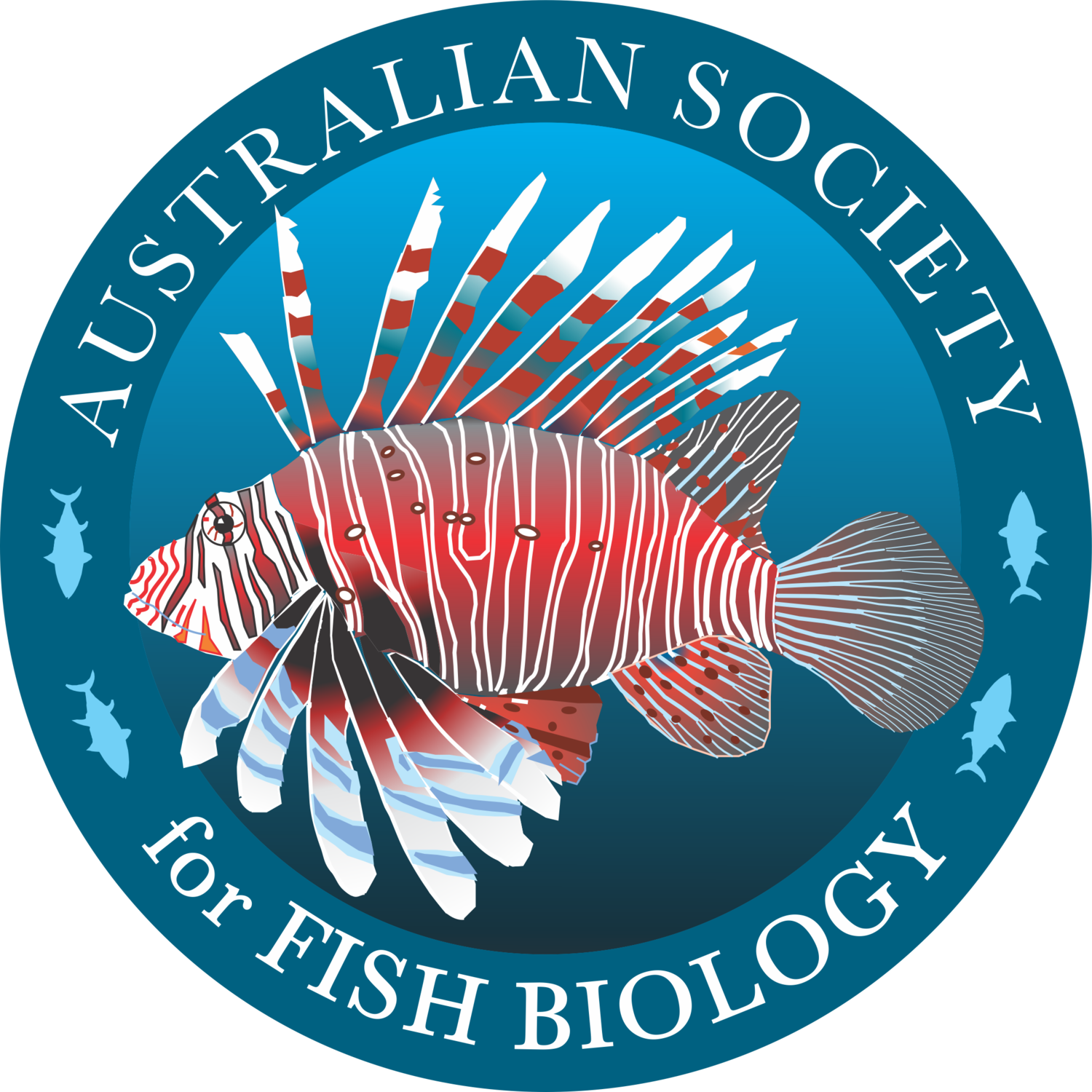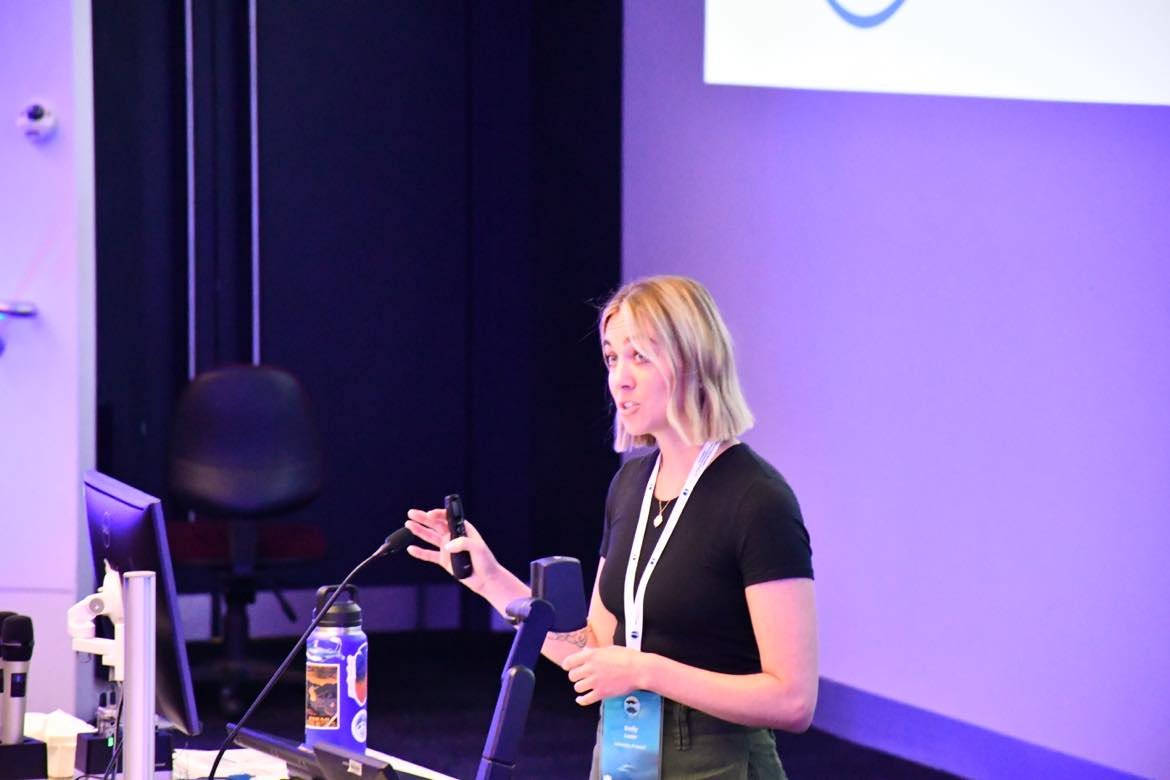On the line with… Emily Lester
Emily Lester is a marine ecologist and a recent Fulbright Scholar at the University of Hawai’i.
We spoke with her about her journey so far and what lies on her career horizon.
Emily, you gave a plenary presentation at the IPFC-ASFB 2023 Conference last year. Could you give us a brief introduction to yourself?
I am currently a Research Ecologist working at the Australian Institute of Marine Science. Broadly, my research is focussed on predator-prey interactions and the ways that humans are inadvertently changing marine animal behaviour and fundamentally re-structuring marine systems.
What would you say is your earliest ‘fishy’ memory?
This isn’t technically my earliest ‘fishy’ memory, but my favourite ‘fishy’ memory is seeing the Ningaloo Reef for the first time. The Ningaloo Reef is a remarkable part of the world, it is a World Heritage listed fringing reef that is a bustling and diverse seascape. After I stuck my head under the water, I fell for the place pretty hard and pretty fast. If you have ever heard me speak, you’d pick up on a rather prominent Aussie accent, but I actually grew up in the UK. After seeing the Ningaloo Reef and its fascinating inhabitants, this set in motion a plan for me to move to Western Australia and to study marine science, and I have never looked back.
Emily delivering a plenary presentation at the IPFC-ASFB 2023 Conference in Auckland.
In your IPFC-ASFB plenary you discussed predator-prey interactions. Could you share some insights from your research?
My research uses small-scale field-based experimental approaches to manipulate and explore ecological mechanisms, which are otherwise difficult to observe in the wild. I then use natural experiments to tests predictions that emerge from this work over larger spatial scales (100s - 1000s km) in complex systems. Through this work, we have found that large predators, such as reef sharks, can alter important behaviours, such as foraging, but these interactions are mediated by both the characteristics of the predators and their prey as well as the dynamic environment in which these interactions occur.
This combination of small-scale experiments and large-scale approaches demonstrates the nuanced, context-dependent nature of interactions between predatory and prey species in diverse and complex coral reef ecosystems.
In 2022 you gave a TEDxKings Park presentation on how fear drives our coral reef environments. Can you break down some key takeaways from your research?
This talk was pitched at a very general audience, so I focussed on explaining how predators, like reef sharks, can exert non-consumptive predator effects in coral reefs.
For example, in shallow lagoonal environments the presence of sharks constrains herbivory to the shelter of the patch reefs, forming reef halo patterns. The main takeaway from the talk was that in some circumstances, a fear of sharks can be a good thing! To be completely honest, that TEDxKings Park talk was one of the most difficult things I have ever done. It was very challenging to describe complex ecological concepts in a short and entertaining talk that was aimed at a general audience. In the end, I learned a lot about science communication and ended up having a lot of fun during the many, many rehearsals.
You’re an advocate for women in STEM. Is there any particular role model you look up to, and how have they influenced your career?
I am lucky enough to have many role models that I have worked with during my career. Recently, I worked in Elizabeth Madin’s Lab at the University of Hawai'i and it was a master class in how to build a lab of exceptional people, support innovative science, and generate a culture of collaboration rather than competition. The calibre of science that comes out of her lab speaks for itself and is testament to the effectiveness of this approach.
What is next on your horizon in terms of research? What can we expect from your next projects?
In the future, I am excited to continue a trajectory of research that seeks to understand how ecological processes, such as predator-prey interactions, unfold under the footprint of human activity from local to global spatial scales. I have a couple of fun projects on the go that build on my past research. The project that I am currently most excited about involves drawing comparisons of predator-prey interactions in both marine and terrestrial ecosystems. It is a lot of fun to think about these concepts and I cannot wait to share it with the research community.
"On the line" is a regular series featuring interviews with ASFB members and other fish researchers. Emily Lester delivered an invited plenary at the IPFC-ASFB 2023 Conference in Auckland, New Zealand in November 2023.
Emily Lester was a recipient of the ASFB Early Career International Travel Grant, one of the ways ASFB is helping to promote early career researchers advance their careers. Check out our Awards Page for opportunities available at all career stages.




